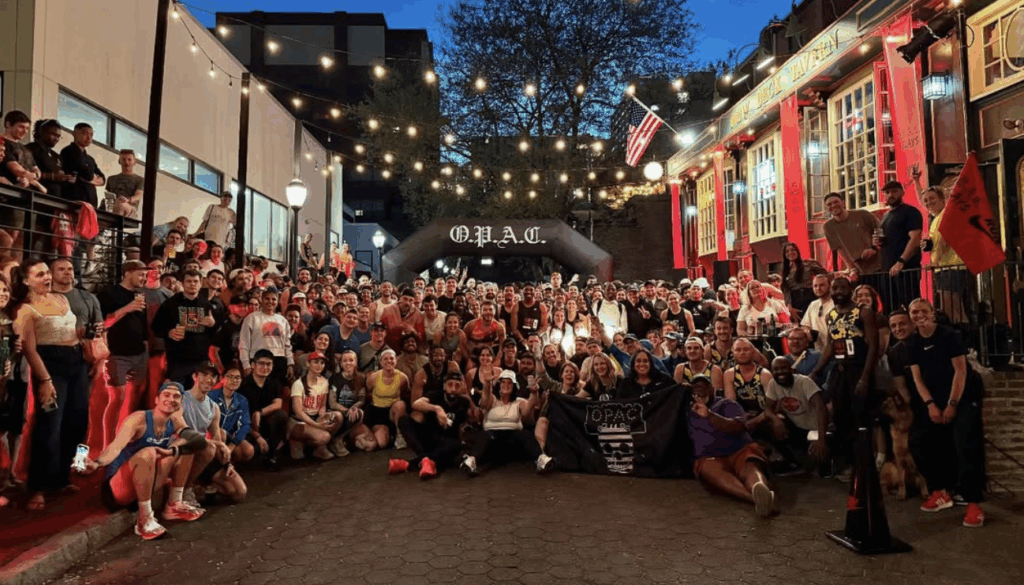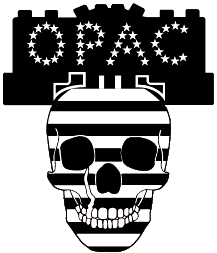Sponsored by
All Faces, All Paces: How O.P.A.C. is Changing the Run Club Game in Philadelphia

On July 31st, I sent out the Run Tri Bike newsletter. The topic was about running clubs, their culture and inclusivity. I wanted to share my thoughts about how often the all paces welcome banner is nothing more than a marketing term and we need to do better. When we say that all paces are welcome that needs to be meant and practiced.
I received an email from a high school friend thanking me for writing the newsletter and pointing me in the direction of Lionel Brodie who is the founder of the O.P.A.C. Running Club in Philadelphia. I reached out immediately because at the top of the O.P.A.C. Instagram feed were the words: Olympic-Level experience for our FAMILY members. ALL FACES | ALL PACES.
Those words were the rainbow I was seeking and Lionel agreeing to chat with me was the unicorn. Below you will read about O.P.A.C. and learn a bit more about their community. If you are part of an endurance sports club and want to have it showcased on our website and social media pages, please connect with me here.
Building a Community from a Dare and a Hangover
When Lionel Brodie laced up his shoes for the first time, he wasn’t chasing a marathon PR or aiming for a Boston qualifier. He was chasing a dare. That dare was made during a night of vodka tonics on a work trip. That morning run in freezing D.C. weather ended with him buying a NASCAR cap for warmth and unknowingly starting a journey that would change his life, and the lives of hundreds of others, through the creation of O.P.A.C. (Original Propaganda Athletic Club).
“I just loved it,” Brodie said, remembering that first run. “Everything I heard about endorphins and runner’s high was a thousand percent true.”
That solo experience eventually evolved into a movement built around community, inclusivity, and culture. These are values that Brodie continues to hold at the heart of O.P.A.C.
From Solo Miles to Shared Miles
Lionel’s early days of running were solo or informal group runs, like the lululemon training program he joined. But it was inspiration from other run crews like Bridge Runners in NYC and Run Dem Crew in London that lit a fire. He wanted a run club that wasn’t just about the miles but about belonging. He was looking for a running club that would also bring inclusivity and culture.
O.P.A.C. wasn’t the first attempt. Brodie initially launched the Villanova Run Club (VRC), a more conservatively branded effort designed to fit the Main Line culture around Villanova University. But like many college-based endeavors, turnover and breakups eventually left Lionel running solo again.
Still, something had shifted. The seed was planted. “Running was like opening a secret door to this cool party,” Brodie said. “And I just wanted to invite everyone in.”
ADVERTISEMENT

All Faces, All Paces—And Actually Meaning It
If you’ve ever been to a run club that claimed “all paces welcome” and got dropped before the first water stop, you’ll understand why O.P.A.C. stands out.
“When we say all faces and all paces, we truly, truly mean it,” Brodie said. “Whether it’s a 4-minute mile or a 24-minute mile, everyone deserves to feel safe and supported.”
That authenticity shows up in the structure. Every Saturday, O.P.A.C. hosts a 1.5-mile walk group, a 5K option, and a distance run starting at 5 miles and scaling based on training needs. The club rotates between two iconic Philly locations, Eakins Oval near the Rocky Steps and Almost Home Coffee in Old City, adding a strong post-run coffee and hangout culture that cements the sense of community.
This weekly rhythm isn’t just about exercise. It’s a space for mental clarity, emotional connection, and human-to-human interaction. “Most people who start walking end up running eventually,” Brodie noted. “But we don’t push it. Just being together is the first step.”
Aha Moments and Evolution
For years, O.P.A.C. carried the “All Faces, All Paces” mantra without fully realizing its depth. It wasn’t until 2019 that Brodie saw how powerful it really was.
At a Philly Marathon weekend event, he listened to members, many who didn’t fit the stereotypical “runner mold”, talk about their ambitious race goals. “It made me realize I’d been focusing too much on people like me,” he said. “I was unintentionally excluding people who were pushing themselves to incredible limits.”
That realization deepened O.P.A.C.’s commitment to real inclusivity. It became something more than just welcoming everyone. The club started to lean toward a culture of celebrating everyone’s running goals, whether that’s completing a first mile or shaving time off a PR.
A Club Built to Celebrate
O.P.A.C. isn’t just about the weekend runs. It’s about showing up for each other and for the city.
The club hosts three major annual events that bring in hundreds of participants:
-
O.P.A.C. Relays (543 attendees in 2024), an unsanctioned race inspired by Penn Relays
-
Philly United, a shakeout run drawing 525 runners ahead of the Philly Marathon
-
O.P.A.C. Expo, a pre-race weekend gathering with over 250 attendees
Brodie is intentional about ensuring these events feel different. “We never want to do rinse and repeat,” he said. “We want to bring unique energy and always acknowledge who inspired the idea.”
And they do. Borrowing ideas from clubs like Pioneers in Boston and TrailblazHers, O.P.A.C. created a rotating “tour” concept, complete with T-shirts designed like old-school concert merch. “We always acknowledge the dish,” Brodie said, referencing his days at AND1 Basketball. “If we got a great idea from someone, we tag them, we give them their flowers.”
Keeping It Real and Rooted
Unlike some clubs where growth means losing that personal touch, O.P.A.C.’s growth has strengthened its core. There’s no hierarchy, no pressure to perform, just the kind of atmosphere where anyone can show up. And by anyone, O.P.A.C. means anyone.
“There are people in this club achieving amazing things, and I had nothing to do with it except creating the space,” Brodie said. “And that’s the goal. It’s a shared success.”
That success is also starting to take root beyond Philadelphia. A chapter in Salt Lake City focuses on youth sports development, targeting underserved communities and keeping kids engaged in healthy, structured activities. There’s even an athletic consultancy branch helping high school students navigate college athletics and avoid the identity loss that can come when sports end.
More Than Running — It’s Connection
For Brodie, O.P.A.C. is about something bigger than pace charts or finish lines. It’s about showing people, especially those in underrepresented communities, that they belong in the world of running.
“We don’t even really use the word ‘runners’ anymore,” he said. “We say ‘athletes.’ Because if you have a body, you’re an athlete.”
O.P.A.C. is the antidote to toxic run culture. It’s the place where crying after a bad run doesn’t make you weak, and where walking to the coffee shop with your medal after Broad Street is just as celebrated as winning your age group.
So if you’ve been thinking about running but felt like you wouldn’t because you’ve thought that maybe you’re “not so fast,” or maybe you’re new. There is the possibility that you’re just curious but don’t worry because O.P.A.C. has a spot for you.
“You’re not getting paid to be here,” Brodie said. “So if you’re going to spend your time doing this, you should feel good doing it. That’s the only thing that keeps people coming back.”
ADVERTISEMENT








